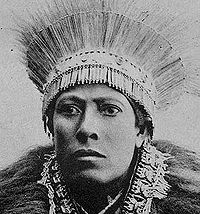
Balcha Safo
Encyclopedia

Ethiopia
Ethiopia , officially known as the Federal Democratic Republic of Ethiopia, is a country located in the Horn of Africa. It is the second-most populous nation in Africa, with over 82 million inhabitants, and the tenth-largest by area, occupying 1,100,000 km2...
n general, who served in both the First and Second Italo-Ethiopian Wars. He came from a non-aristocratic background. Even so, he became a Provincial Governor
Governor
A governor is a governing official, usually the executive of a non-sovereign level of government, ranking under the head of state...
(Shum) and came to represent a provincial ruling elite who were often at odds with the Ethiopian central government.
Early career
Balcha was found on a battlefield in GuragelandGurage
Gurage is an ethnic group in Ethiopia. According to the 2007 national census, its population is 1,867,377 people , of whom 792,659 are urban dwellers. This is 2.53% of the total population of Ethiopia, or 7.52% of the Southern Nations, Nationalities, and People's Region...
after having been emasculated
Emasculation
Emasculation is the removal of the genitalia of a male, notably the penis and/or the testicles.By extension, the word has also come to mean to render a male less of a man, or to make a male feel less of a man by humiliation. This metaphorical usage of the word is much more common than the...
, which at the time was the usual fate of defeated soldiers. He came to the notice of Emperor Menelik II, who brought him back to Addis Ababa
Addis Ababa
Addis Ababa is the capital city of Ethiopia...
where Balcha was educated. Balcha is believed to be of Oromo
Oromo people
The Oromo are an ethnic group found in Ethiopia, northern Kenya, .and parts of Somalia. With 30 million members, they constitute the single largest ethnic group in Ethiopia and approximately 34.49% of the population according to the 2007 census...
descent; 'Balcha' means 'taming, assimilating or making familiar with' in Afan Oromo.
He distinguished himself at the imperial court and showed particular skill in military exercises and theory. He made his reputation, according to oral tradition, in the Battle of Mek'ele, and later at the Battle of Adwa (March 1, 1896), and was rewarded with elevation to the aristocratic status of dejazmach.
From 1898 to 1908, Balcha was Shum of Sidamo
Sidamo
Sidamo may refer to the following:*Sidamo Province, Ethiopia*The Sidamo language*The Sidamo or Sidama people*Ethiopian Sidamo, a single origin variety of coffee from Ethiopia...
province. After the death of Dejazmach Yilma Makonnen in 1907, he became the Shum of Harar
Harar
Harar is an eastern city in Ethiopia, and the capital of the modern Harari ethno-political division of Ethiopia...
from 1910 to 1914. From 1917 to 1928, he again served as Shum of Sidamo
Sidamo Province
Sidamo was a province in the southern part of Ethiopia, with its capital city at Irgalem, and after 1978 at Awasa. It was named after an ethnic group native to Ethiopia, called the Sidamo, or more particularly, Sidama, who are located in the south-central part of that country...
.
Conflict with Haile Selassie
A conservative who had been loyal to the memory of the deceased Emperor Menelik, Balcha was one of the leading nobles who challenged the growing power of the regent Ras Tafari (who later became Emperor Haile Selassie). A blunt old warrior, he did not trust the young Emperor, who was an advocate for modernizing Ethiopia. In a deft political maneuver, which has since been seen as an example of Haile Selassie's genius, in 1928 the Emperor invited Balcha to the capital for a feast in Balcha's honor. Balcha arrived 11 February with several thousand men, and spent the evening "generally insolent and threatening in conversation." The Dejazmach's lieutenants were made so nervous by the old man's misbehavior that they privately met with Ras Tafari to disavow any prior knowledge of his possible violent actions.Meanwhile, the regent sent Ras Kassa Haile Darge
Kassa Haile Darge
Ras Kassa Haile Darge GCVO, GBE , was a Shewan nobleman, the son of Haile Wolde Kiros of Lasta and Tisseme Darge, and grandson of Ras Darge Sahle Selassie the brother of Menelik II's father....
to Balcha's camp, where he paid off the soldiers Balcha had left there. At the same time the Emperor appointed Dejazmach Birru Wolde Gabriel to replace Balcha as governor of Sidamo. These simultaneous acts deprived Balcha of his ability to resist, a loss he discovered only after he returned to the camp. After evaluating his limited options, on 21 February the Dejazmach humiliated himself before the regent.
Death
When Italy invaded in the Second Italo-Abyssinian WarSecond Italo-Abyssinian War
The Second Italo–Abyssinian War was a colonial war that started in October 1935 and ended in May 1936. The war was fought between the armed forces of the Kingdom of Italy and the armed forces of the Ethiopian Empire...
, Balcha Safo came out of retirement to fight against the Italians. Major Mesfin Seleshi, an agent of the imperial government in exile who was coordinating resistance in occupied Ethiopia, writes of his fate in a letter to Haile Selassie I thus:
The enemy went as far as Gurage, where his Excellency Dejazmatch Balcha lives, and campaigned against him. The people betrayed him, and all his men were annihilated. He and two of his servants, three people all together, were surrounded. A white man came to him and asked, are you Dejazmatch Balcha? When he said yes I am, the white man said, surrender your arms, and untie your pistol [belt]. Dejazmatch Balcha said, 'I am not here to surrender my arms', and he killed the white man; then, he and his two servants died instantly without having much suffering.

